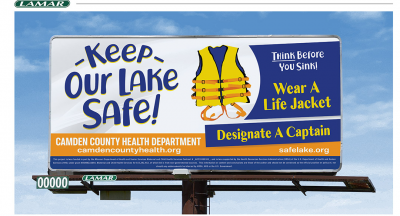BOATING SAFETY TIPS
Boaters! Before Getting Underway:
Know your boat and know the rules of the road.
- Take a safe boating course.
- Check your boat for all required safety equipment.
- Consider the size of your boat, the number of passengers and the amount of extra equipment that will be on-board. DON’T OVERLOAD THE BOAT!
- If you will be in a power boat, check your electrical system and fuel system for gas fumes.
- Follow manufacturers suggested procedures BEFORE starting up the engine.
- Wear your life jacket – don’t just carry one on board.
- Leave alcohol behind to increase your safety and decrease your risk.
- Check the weather forecast.
- File a float plan with a member of your family or friend.Swimmers!
Since most drowning victims had no intention of being in water and since most people drown within 10-30 feet of safety, it is important that you and your family learn to swim well.
Please remember:
- Never rely on toys such as inner tubes and water wings to stay afloat.
- Don’t take chances, by overestimating your swimming skills.
- Swim only in designated swimming areas.
- Never swim alone.
Drowning Fatalities:
According to the Center for Disease Control, each year over 3,400 people drown in the United States. Drowning is the SECOND leading cause of accidental deaths for persons 1-14 years of age and the sixth leading cause for all ages.
What is really surprising is that two-thirds of the people who drown never had an intention of being in the water!Divers! Never dive into lakes and rivers…the results can be tragic. Every year, diving accidents result in thousands of people suffering paralyzing spinal cord injuries and many of them die before they reach the hospital. All too often, hidden dangers lurk beneath the surface of the water, even in shallow water, including current, rocks, and debris.
Watch Small Children!
- Center for Disease Control statistics show an average of over 800 children under the age of 15 drown each year. Thousands of others are treated in hospitals for submersion accidents, accidents which leave children with permanent brain damage and respiratory health problems.
- Remember, it only takes a few seconds for a small child to wander away. Children have a natural curiosity and attraction to water.Alcohol- The Fun Killer?
- It’s a fact; alcohol and water do not mix! More than half of all the people that are injured in a boating accident had consumed alcohol prior to their accident and 20% of them don’t live to tell about it.
- Being intoxicated is not necessary for alcohol to be a threat to your safety. Just one beer will impair your balance, vision, judgment and reaction time, thus making you a potential danger to yourself and others.
- Research shows that four hours of boating, exposure to noise, vibration, sun, glare and wind produces fatigue that makes you act as if you were legally intoxicated. If you combine alcohol consumption with this boating fatigue condition, it intensifies the effects and increases your accident risk.
- So remember, don’t include alcohol in your outing, if you’re planning to have fun in, on, or near the water.Cold Water Survival!
All boaters should wear a life jacket and dress for the water temperature, not the air temperature. Cold-water immersion causes many boating-related fatalities. It follows four stages, starting with cold shock, followed by swimming failure, then hypothermia and finally post-rescue collapse. Most cold-water drowning fatalities are attributed to the first two stages.
- The initial shock of cold water causes involuntary gasping making it difficult to catch your breath and many people hyperventilate, faint, and drown before they are able to calm down their breathing.
- The longer you are exposed to cold water, the more you lose your ability to move your extremities. If you haven’t been able to get out of the water in 5-15 minutes you need to stop moving. Movement will deplete your energy faster and increase heat loss.
- Hypothermia is a condition in which the body loses heat faster than it can produce it. Violent shivering develops which may give way to confusion and eventually cardiac arrest or unconsciousness.If you fall in the water, in any season, you need to know cold water survival skills. Many of our nation’s open waters are mountain fed, and water temperatures even in late summer can run low enough to bring on this condition under certain conditions.
It’s important to remember:
- Don’t discard clothing and dress warmly with wool clothing. Clothing layers provide some warmth that may actually assist you in fighting hypothermia. This includes shoes and hats. A popular myth is that wet clothes will weigh you down in the water and they are actually only heavy when you are out of the water.
- Wear your life jacket! This helps hold heat into the core areas of your body, and enables you to easily put yourself into the HELP position. HELP (Heat Escape Lessening Posture) by drawing limbs into your body; keep armpits and groin areas protected from unnecessary exposure – a lot of heat can be lost from those areas, as well as the head.

